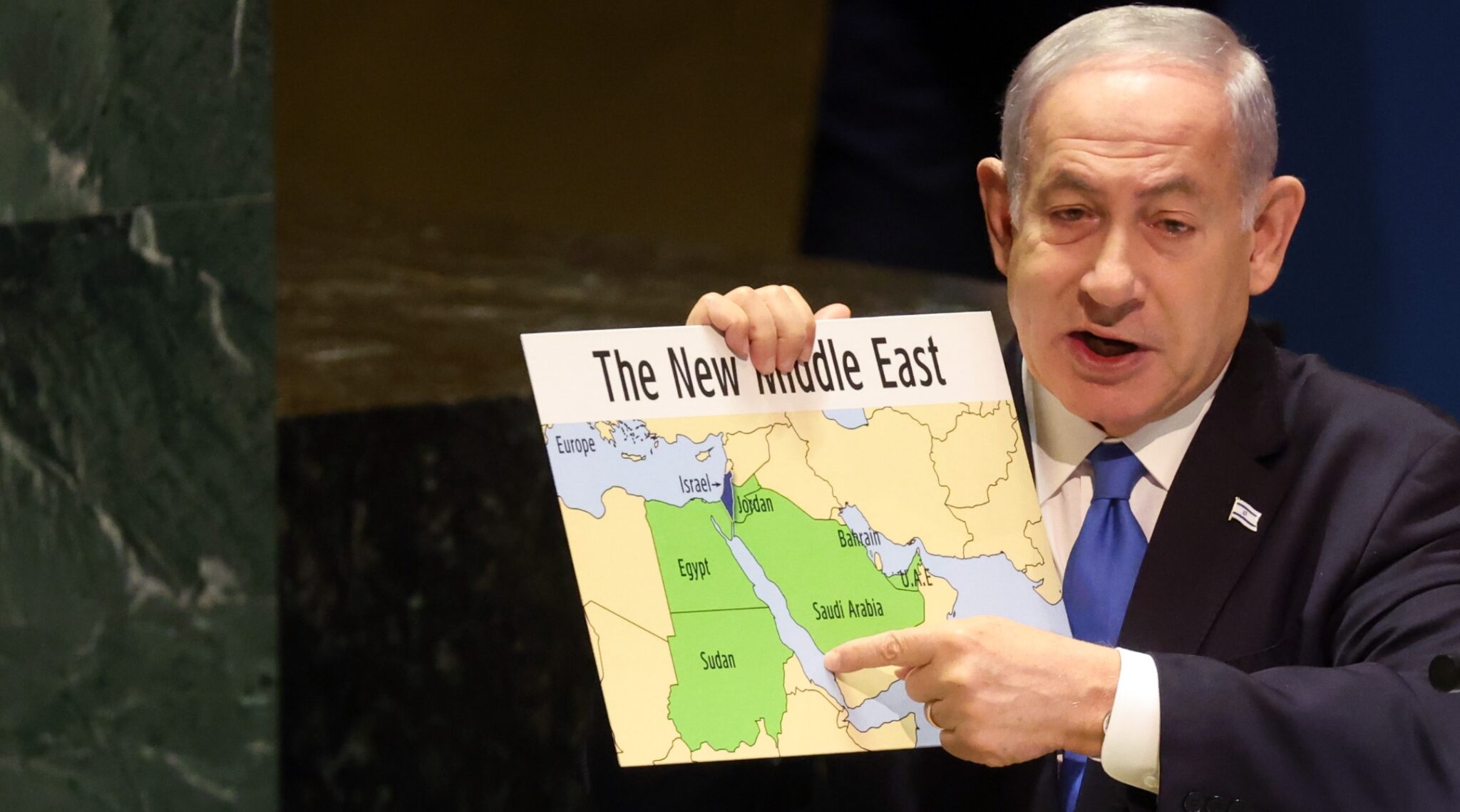No roadmap yet but a deal could be in sight
Saudi Arabia's Crown Prince Mohammed bin Salman says that a normalisation pact with Israel would be “the biggest historical deal since the Cold War."

Out in the Gulf, the heat is abating. As autumn and darkness loom back home, the air here is emptying itself of moisture; the summer’s enveloping thickness is diffusing to a pleasant warmth.
The weather, though, is not the only thing that is cooling. The region has undergone – to continue with this now laboured metaphor – a political seasonal change over the past few years. The 2020 Abraham Accords, the series of normalisation agreements signed between several Arab states and Israel, upended decades of foreign policy groupthink as well as the region’s geopolitics.
Now, it seems, further upheaval may be imminent. Last week, Israeli Prime Minister Benjamin Netanyahu told the U.N. General Assembly that his country is “at the cusp” of a breakthrough that could end in a normalisation agreement with Saudi Arabia. If geopolitics is characterised by long periods of tedium interspersed with intense drama (usually violent), the reporting of it often carries the stamp of hyperbole and cliche.

But this time any outpourings would not be incontinent. Saudi Arabia is not only now, following the decline of Egypt, the “Sunni Lion” – the foremost Sunni Arab power – but of course the country of Islam’s two holiest sites, Mecca and Medina. Every Saudi ruler, currently Salman bin Abdulaziz Al Saud, is styled the “Custodian of the Two Holy Mosques” (Khādim al-Ḥaramayn aš-Šarīfayn). Recognising Israel in any form would go against what was once a key principle for Riyadh.
But, after months of negotiations mediated by the White House a deal of some form may be in sight. We remain a way off. No clear path, or ‘roadmap” has been publicly outlined. Neither is there any talk of concessions to the Palestinians (let alone the establishment of a Palestinian state, which for decades was the near unanimous condition of the broader Arab world for peace with Israel).
This hasn’t stopped the gushing. Netanyahu told CNN, that a deal would “change the Middle East forever,” bringing down “walls of enmity” and creating “a corridor of energy pipelines, rail lines, fiber optic cables, between Asia through Saudi Arabia, Jordan, Israel, and the United Arab Emirates.”

From the Saudi side, Crown Prince Mohammed bin Salman said that a normalisation pact with Israel would be “the biggest historical deal since the Cold War.” In an interview with Fox News, he did also insert the caveat that he hoped affairs would “reach a place that will ease the life of the Palestinians”.
Things are moving. The question remains: will it actually happen? It is a big leap and, in the end, it is 87-year-old King Salman’s signature that will be on the documents, and in the historical record. Some believe it may be a step too far right now. Especially given the governing coalition in Israel, which contains hard and far right elements that could make any deal even more controversial right now.
“It may well be that the actual finalities will have to be done when MBS [Mohammed bin Salman] officially ascends to the throne,” said a regional affairs expert to me last week. “It’s clear he is keen for this. We may have to wait.”
The very fact that MBS at just 38, could well soon be King of Saudi Arabia is instructive of the changes that have been going on inside the Kingdom. MBS’s father became king at 79, and his father, King Abdullah became king at 80. Now, the kingdom is in large part ruled by a Millennial and the effects on everything from allowing women to drive and a more outward-facing foreign policy are plain to see. If the region is undergoing profound political change, so is the Kingdom.
“The Abraham Accords are here to stay,” an Emirati foreign policy expert recently told me over coffee. Now they may expand to encompass the birthplace of Islam. If this happens, it can be said, without fear of hyperbole, that those two cliches – historic and unprecedented – would be entirely warranted.
- David Patrikarakos is the Foreign Correspondent for Unherd

Thank you for helping to make Jewish News the leading source of news and opinion for the UK Jewish community. Today we're asking for your invaluable help to continue putting our community first in everything we do.
For as little as £5 a month you can help sustain the vital work we do in celebrating and standing up for Jewish life in Britain.
Jewish News holds our community together and keeps us connected. Like a synagogue, it’s where people turn to feel part of something bigger. It also proudly shows the rest of Britain the vibrancy and rich culture of modern Jewish life.
You can make a quick and easy one-off or monthly contribution of £5, £10, £20 or any other sum you’re comfortable with.
100% of your donation will help us continue celebrating our community, in all its dynamic diversity...
Engaging
Being a community platform means so much more than producing a newspaper and website. One of our proudest roles is media partnering with our invaluable charities to amplify the outstanding work they do to help us all.
Celebrating
There’s no shortage of oys in the world but Jewish News takes every opportunity to celebrate the joys too, through projects like Night of Heroes, 40 Under 40 and other compelling countdowns that make the community kvell with pride.
Pioneering
In the first collaboration between media outlets from different faiths, Jewish News worked with British Muslim TV and Church Times to produce a list of young activists leading the way on interfaith understanding.
Campaigning
Royal Mail issued a stamp honouring Holocaust hero Sir Nicholas Winton after a Jewish News campaign attracted more than 100,000 backers. Jewish Newsalso produces special editions of the paper highlighting pressing issues including mental health and Holocaust remembrance.
Easy access
In an age when news is readily accessible, Jewish News provides high-quality content free online and offline, removing any financial barriers to connecting people.
Voice of our community to wider society
The Jewish News team regularly appears on TV, radio and on the pages of the national press to comment on stories about the Jewish community. Easy access to the paper on the streets of London also means Jewish News provides an invaluable window into the community for the country at large.
We hope you agree all this is worth preserving.





















